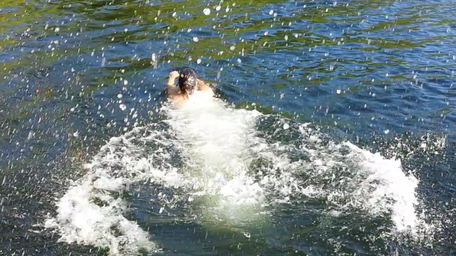 I went back down the stone stairs leading to the dock and dove in. I used two strategies:
Together, these two strategies worked perfectly. The water was cold and wonderful. Warmly, but not as warm as usual, Coach Minda
5 Comments
Mensch - Yiddish/German word that means "a person of integrity."  In conversation with a distraught father about his 'difficult' teenage son, I said, "Right now, I wouldn't be concerned about what he decides to do with his life or whether he has goals. My first order of priority would be to make sure he is a mensch." Mensch is not a word I use often. It just spilled out of my mouth and expressed exactly what I meant. This father needed to be able to respect his son for his decency, integrity and goodness --and then for his ambitions and goals. It is easier to be a mensch when life is on an even keel. How hard is it to be good, kind and generous when there are no stresses pushing on us? When things are rocky, however, our integrity can be tested. Our own fears, lack of confidence, insecurity and impatience triggers the reflex to protect and defend our interests and conserve our energy. And this can lead to less than mensch-like behavior. In my opinion, trying to raise a mensch should be a central focus and preoccupation of family life. As adults, it continues to be an on-going effort: at home, at work, in the community and in our social life. Cultivating mensch-like behavior is critical to our success and excellence at work, as well as with family and personal relationships. There is always room to strengthen character traits such as as humility, authenticity, empathy and generosity. And, at the same time, continue to:
Coach Minda  We have taken to 'farming' in our backyard -- tomatoes, mustard greens, a variety of lettuces and herbs. While turning over the earth to plant, or when weeding, long lost items surface in the garden. Lumps of coal from decades back when the house had a coal furnace. Marbles. Bits of glass. Loose change. They seem to work their way to the surface and appear after a rain where a day earlier the earth was just earth. This made me reflect on how everyday experiences can surface unexpected emotions:
Unexpected and unearthed emotions can feel very uncomfortable. Especially when they seem to surface out of nowhere. And even more so when they break into a day where you were feeling just fine. Emotions hidden and out of sight can quickly become disruptive. These feelings often signal what is important to us at any given moment. They direct our attention to what matters. The key is slowing down enough to feel the feeling. To let the feeling linger, un-interrupted and un-analyzed. To feel it without explaining it to yourself. Then, as it passes we can turn our attention to understanding what lies under the feeling. If we react too quickly and don't tune in to what the unexpected emotion is telling us, we are more likely to:
Back to the loose change in the garden. A dime that turned up the other day gave me exact change for a baguette I bought for $2.10. And the dime's unusual patina from all those years in the garden might unearth other stories, now that it's back in general circulation. Giving you my ten cents worth, Coach Minda |
My family, relationships, movement, nature, flexibility of mind, exploration of alternative perspectives & openness are central to my life.Archives
December 2021
|
Private and confidential
|
Connect with me
|



